Employee Confidentiality Breach and Employment Contract
VerifiedAdded on 2021/04/24
|11
|2406
|43
AI Summary
This assignment involves analyzing a case study where a hotel employee misused confidential information, leading to a breach of their employment contract. The discussion explores the implications of this breach, including the potential for damages and costs. Strategies are suggested for the hotel to prevent similar incidents in the future, such as limiting access to sensitive information and restricting the use of gadgets in areas where confidential data is stored.
Contribute Materials
Your contribution can guide someone’s learning journey. Share your
documents today.
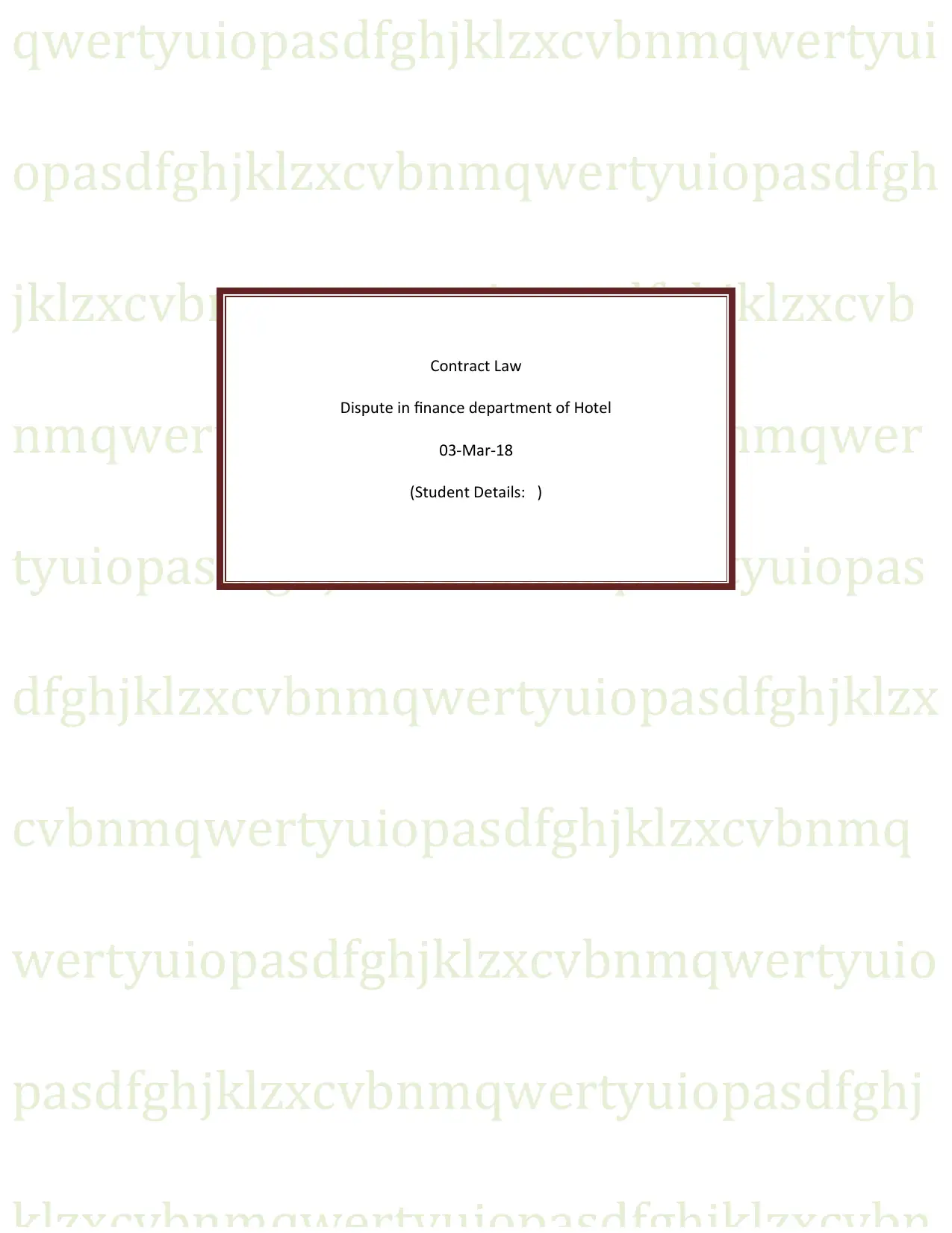
qwertyuiopasdfghjklzxcvbnmqwertyui
opasdfghjklzxcvbnmqwertyuiopasdfgh
jklzxcvbnmqwertyuiopasdfghjklzxcvb
nmqwertyuiopasdfghjklzxcvbnmqwer
tyuiopasdfghjklzxcvbnmqwertyuiopas
dfghjklzxcvbnmqwertyuiopasdfghjklzx
cvbnmqwertyuiopasdfghjklzxcvbnmq
wertyuiopasdfghjklzxcvbnmqwertyuio
pasdfghjklzxcvbnmqwertyuiopasdfghj
Contract Law
Dispute in finance department of Hotel
03-Mar-18
(Student Details: )
opasdfghjklzxcvbnmqwertyuiopasdfgh
jklzxcvbnmqwertyuiopasdfghjklzxcvb
nmqwertyuiopasdfghjklzxcvbnmqwer
tyuiopasdfghjklzxcvbnmqwertyuiopas
dfghjklzxcvbnmqwertyuiopasdfghjklzx
cvbnmqwertyuiopasdfghjklzxcvbnmq
wertyuiopasdfghjklzxcvbnmqwertyuio
pasdfghjklzxcvbnmqwertyuiopasdfghj
Contract Law
Dispute in finance department of Hotel
03-Mar-18
(Student Details: )
Secure Best Marks with AI Grader
Need help grading? Try our AI Grader for instant feedback on your assignments.
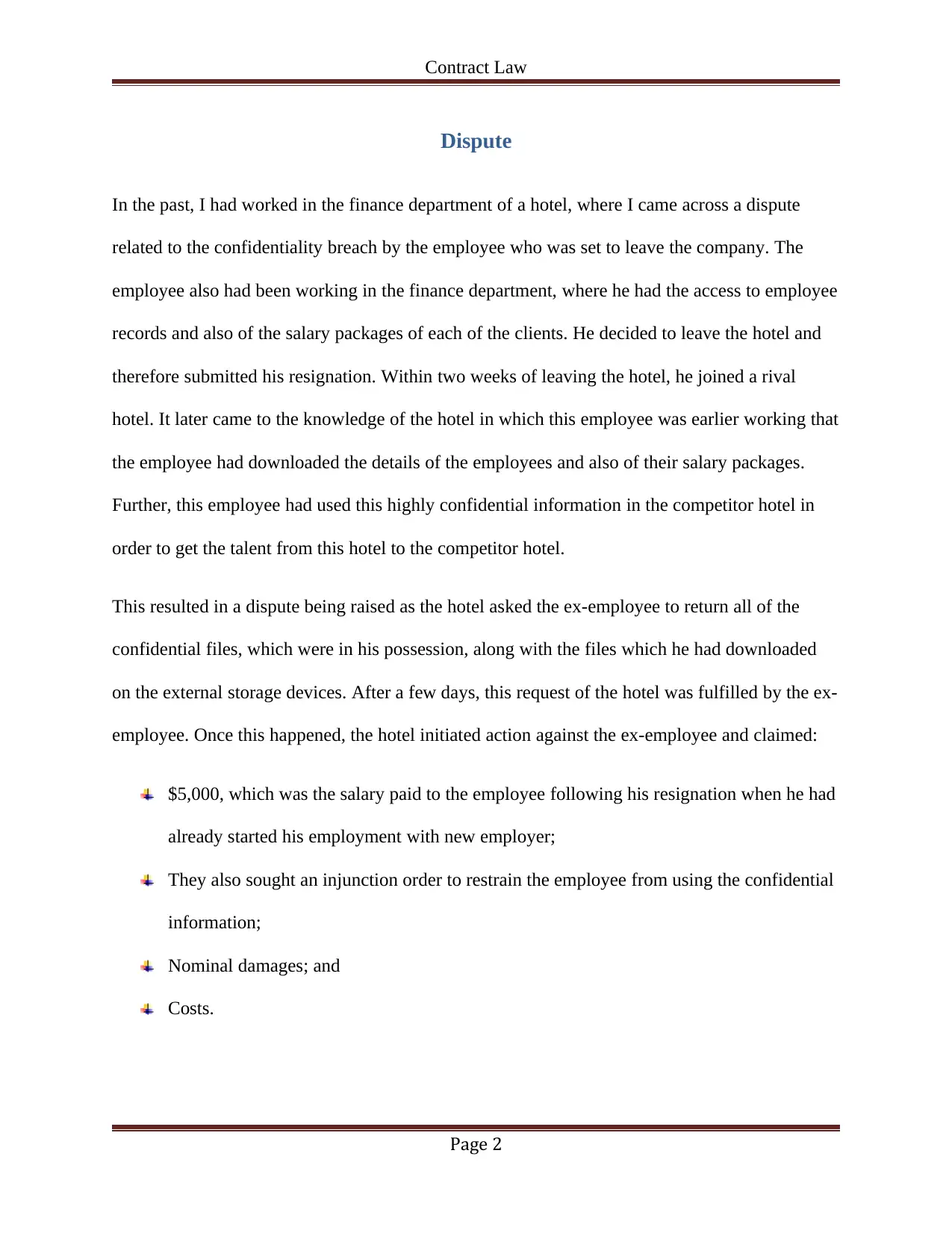
Contract Law
Dispute
In the past, I had worked in the finance department of a hotel, where I came across a dispute
related to the confidentiality breach by the employee who was set to leave the company. The
employee also had been working in the finance department, where he had the access to employee
records and also of the salary packages of each of the clients. He decided to leave the hotel and
therefore submitted his resignation. Within two weeks of leaving the hotel, he joined a rival
hotel. It later came to the knowledge of the hotel in which this employee was earlier working that
the employee had downloaded the details of the employees and also of their salary packages.
Further, this employee had used this highly confidential information in the competitor hotel in
order to get the talent from this hotel to the competitor hotel.
This resulted in a dispute being raised as the hotel asked the ex-employee to return all of the
confidential files, which were in his possession, along with the files which he had downloaded
on the external storage devices. After a few days, this request of the hotel was fulfilled by the ex-
employee. Once this happened, the hotel initiated action against the ex-employee and claimed:
$5,000, which was the salary paid to the employee following his resignation when he had
already started his employment with new employer;
They also sought an injunction order to restrain the employee from using the confidential
information;
Nominal damages; and
Costs.
Page 2
Dispute
In the past, I had worked in the finance department of a hotel, where I came across a dispute
related to the confidentiality breach by the employee who was set to leave the company. The
employee also had been working in the finance department, where he had the access to employee
records and also of the salary packages of each of the clients. He decided to leave the hotel and
therefore submitted his resignation. Within two weeks of leaving the hotel, he joined a rival
hotel. It later came to the knowledge of the hotel in which this employee was earlier working that
the employee had downloaded the details of the employees and also of their salary packages.
Further, this employee had used this highly confidential information in the competitor hotel in
order to get the talent from this hotel to the competitor hotel.
This resulted in a dispute being raised as the hotel asked the ex-employee to return all of the
confidential files, which were in his possession, along with the files which he had downloaded
on the external storage devices. After a few days, this request of the hotel was fulfilled by the ex-
employee. Once this happened, the hotel initiated action against the ex-employee and claimed:
$5,000, which was the salary paid to the employee following his resignation when he had
already started his employment with new employer;
They also sought an injunction order to restrain the employee from using the confidential
information;
Nominal damages; and
Costs.
Page 2
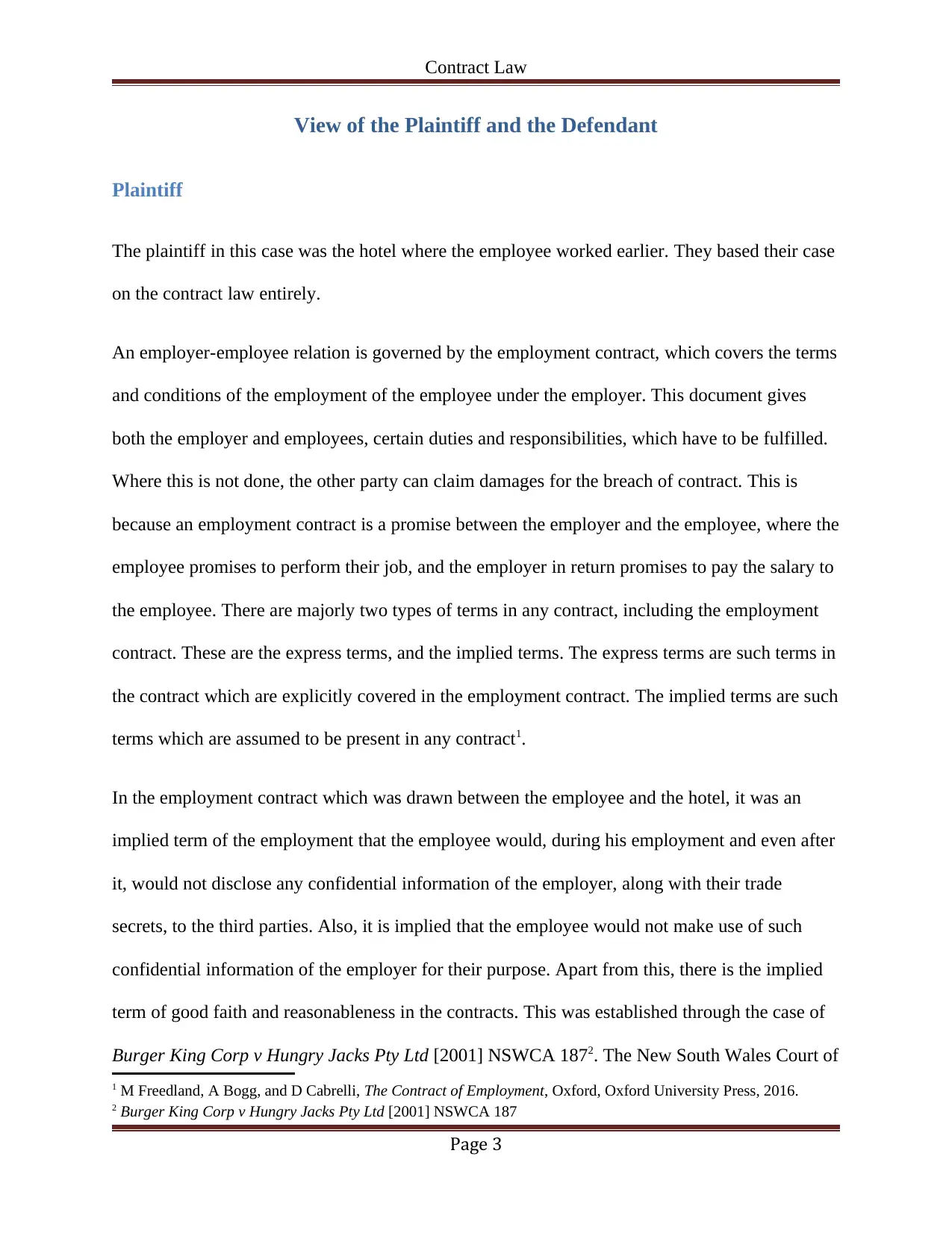
Contract Law
View of the Plaintiff and the Defendant
Plaintiff
The plaintiff in this case was the hotel where the employee worked earlier. They based their case
on the contract law entirely.
An employer-employee relation is governed by the employment contract, which covers the terms
and conditions of the employment of the employee under the employer. This document gives
both the employer and employees, certain duties and responsibilities, which have to be fulfilled.
Where this is not done, the other party can claim damages for the breach of contract. This is
because an employment contract is a promise between the employer and the employee, where the
employee promises to perform their job, and the employer in return promises to pay the salary to
the employee. There are majorly two types of terms in any contract, including the employment
contract. These are the express terms, and the implied terms. The express terms are such terms in
the contract which are explicitly covered in the employment contract. The implied terms are such
terms which are assumed to be present in any contract1.
In the employment contract which was drawn between the employee and the hotel, it was an
implied term of the employment that the employee would, during his employment and even after
it, would not disclose any confidential information of the employer, along with their trade
secrets, to the third parties. Also, it is implied that the employee would not make use of such
confidential information of the employer for their purpose. Apart from this, there is the implied
term of good faith and reasonableness in the contracts. This was established through the case of
Burger King Corp v Hungry Jacks Pty Ltd [2001] NSWCA 1872. The New South Wales Court of
1 M Freedland, A Bogg, and D Cabrelli, The Contract of Employment, Oxford, Oxford University Press, 2016.
2 Burger King Corp v Hungry Jacks Pty Ltd [2001] NSWCA 187
Page 3
View of the Plaintiff and the Defendant
Plaintiff
The plaintiff in this case was the hotel where the employee worked earlier. They based their case
on the contract law entirely.
An employer-employee relation is governed by the employment contract, which covers the terms
and conditions of the employment of the employee under the employer. This document gives
both the employer and employees, certain duties and responsibilities, which have to be fulfilled.
Where this is not done, the other party can claim damages for the breach of contract. This is
because an employment contract is a promise between the employer and the employee, where the
employee promises to perform their job, and the employer in return promises to pay the salary to
the employee. There are majorly two types of terms in any contract, including the employment
contract. These are the express terms, and the implied terms. The express terms are such terms in
the contract which are explicitly covered in the employment contract. The implied terms are such
terms which are assumed to be present in any contract1.
In the employment contract which was drawn between the employee and the hotel, it was an
implied term of the employment that the employee would, during his employment and even after
it, would not disclose any confidential information of the employer, along with their trade
secrets, to the third parties. Also, it is implied that the employee would not make use of such
confidential information of the employer for their purpose. Apart from this, there is the implied
term of good faith and reasonableness in the contracts. This was established through the case of
Burger King Corp v Hungry Jacks Pty Ltd [2001] NSWCA 1872. The New South Wales Court of
1 M Freedland, A Bogg, and D Cabrelli, The Contract of Employment, Oxford, Oxford University Press, 2016.
2 Burger King Corp v Hungry Jacks Pty Ltd [2001] NSWCA 187
Page 3
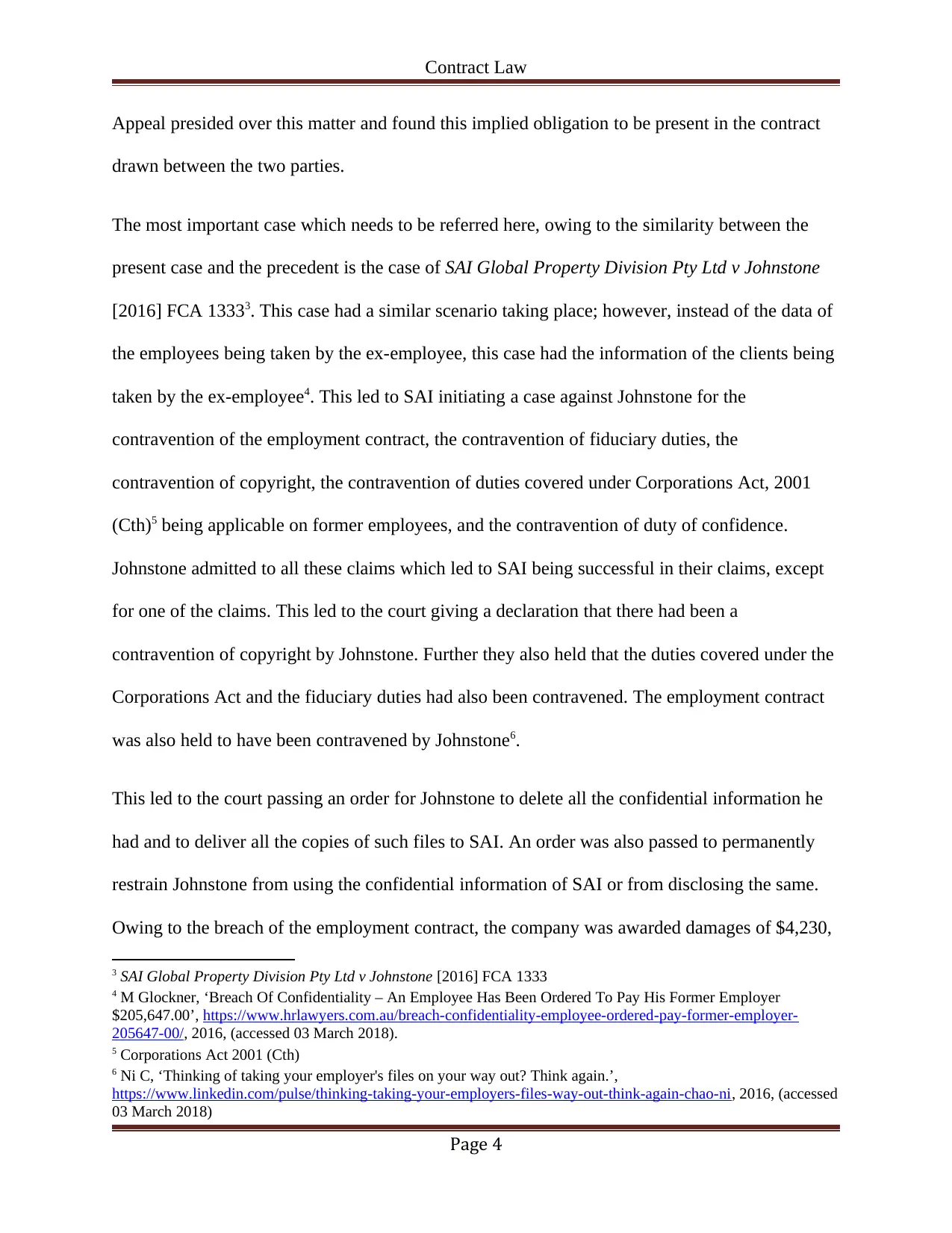
Contract Law
Appeal presided over this matter and found this implied obligation to be present in the contract
drawn between the two parties.
The most important case which needs to be referred here, owing to the similarity between the
present case and the precedent is the case of SAI Global Property Division Pty Ltd v Johnstone
[2016] FCA 13333. This case had a similar scenario taking place; however, instead of the data of
the employees being taken by the ex-employee, this case had the information of the clients being
taken by the ex-employee4. This led to SAI initiating a case against Johnstone for the
contravention of the employment contract, the contravention of fiduciary duties, the
contravention of copyright, the contravention of duties covered under Corporations Act, 2001
(Cth)5 being applicable on former employees, and the contravention of duty of confidence.
Johnstone admitted to all these claims which led to SAI being successful in their claims, except
for one of the claims. This led to the court giving a declaration that there had been a
contravention of copyright by Johnstone. Further they also held that the duties covered under the
Corporations Act and the fiduciary duties had also been contravened. The employment contract
was also held to have been contravened by Johnstone6.
This led to the court passing an order for Johnstone to delete all the confidential information he
had and to deliver all the copies of such files to SAI. An order was also passed to permanently
restrain Johnstone from using the confidential information of SAI or from disclosing the same.
Owing to the breach of the employment contract, the company was awarded damages of $4,230,
3 SAI Global Property Division Pty Ltd v Johnstone [2016] FCA 1333
4 M Glockner, ‘Breach Of Confidentiality – An Employee Has Been Ordered To Pay His Former Employer
$205,647.00’, https://www.hrlawyers.com.au/breach-confidentiality-employee-ordered-pay-former-employer-
205647-00/, 2016, (accessed 03 March 2018).
5 Corporations Act 2001 (Cth)
6 Ni C, ‘Thinking of taking your employer's files on your way out? Think again.’,
https://www.linkedin.com/pulse/thinking-taking-your-employers-files-way-out-think-again-chao-ni, 2016, (accessed
03 March 2018)
Page 4
Appeal presided over this matter and found this implied obligation to be present in the contract
drawn between the two parties.
The most important case which needs to be referred here, owing to the similarity between the
present case and the precedent is the case of SAI Global Property Division Pty Ltd v Johnstone
[2016] FCA 13333. This case had a similar scenario taking place; however, instead of the data of
the employees being taken by the ex-employee, this case had the information of the clients being
taken by the ex-employee4. This led to SAI initiating a case against Johnstone for the
contravention of the employment contract, the contravention of fiduciary duties, the
contravention of copyright, the contravention of duties covered under Corporations Act, 2001
(Cth)5 being applicable on former employees, and the contravention of duty of confidence.
Johnstone admitted to all these claims which led to SAI being successful in their claims, except
for one of the claims. This led to the court giving a declaration that there had been a
contravention of copyright by Johnstone. Further they also held that the duties covered under the
Corporations Act and the fiduciary duties had also been contravened. The employment contract
was also held to have been contravened by Johnstone6.
This led to the court passing an order for Johnstone to delete all the confidential information he
had and to deliver all the copies of such files to SAI. An order was also passed to permanently
restrain Johnstone from using the confidential information of SAI or from disclosing the same.
Owing to the breach of the employment contract, the company was awarded damages of $4,230,
3 SAI Global Property Division Pty Ltd v Johnstone [2016] FCA 1333
4 M Glockner, ‘Breach Of Confidentiality – An Employee Has Been Ordered To Pay His Former Employer
$205,647.00’, https://www.hrlawyers.com.au/breach-confidentiality-employee-ordered-pay-former-employer-
205647-00/, 2016, (accessed 03 March 2018).
5 Corporations Act 2001 (Cth)
6 Ni C, ‘Thinking of taking your employer's files on your way out? Think again.’,
https://www.linkedin.com/pulse/thinking-taking-your-employers-files-way-out-think-again-chao-ni, 2016, (accessed
03 March 2018)
Page 4
Secure Best Marks with AI Grader
Need help grading? Try our AI Grader for instant feedback on your assignments.
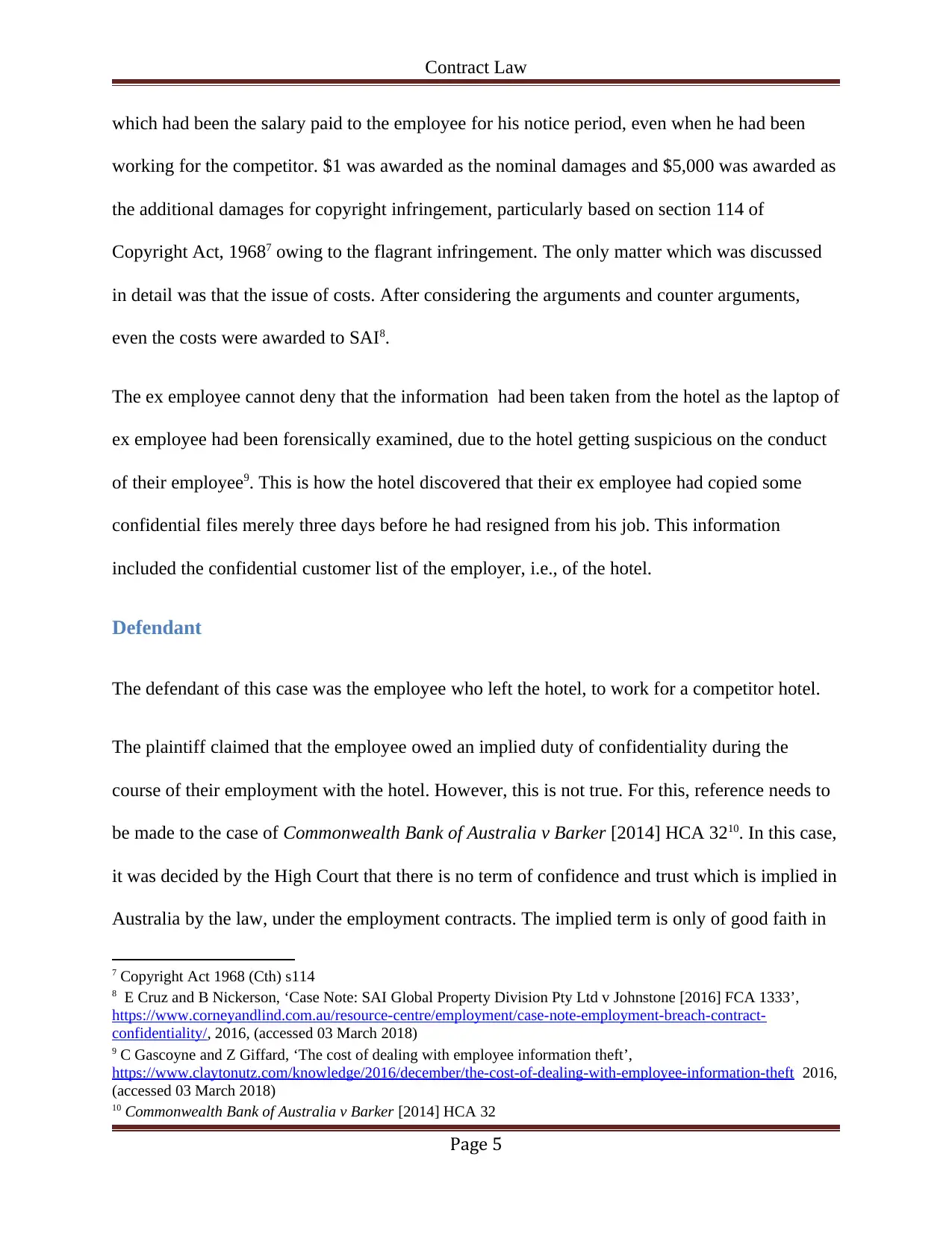
Contract Law
which had been the salary paid to the employee for his notice period, even when he had been
working for the competitor. $1 was awarded as the nominal damages and $5,000 was awarded as
the additional damages for copyright infringement, particularly based on section 114 of
Copyright Act, 19687 owing to the flagrant infringement. The only matter which was discussed
in detail was that the issue of costs. After considering the arguments and counter arguments,
even the costs were awarded to SAI8.
The ex employee cannot deny that the information had been taken from the hotel as the laptop of
ex employee had been forensically examined, due to the hotel getting suspicious on the conduct
of their employee9. This is how the hotel discovered that their ex employee had copied some
confidential files merely three days before he had resigned from his job. This information
included the confidential customer list of the employer, i.e., of the hotel.
Defendant
The defendant of this case was the employee who left the hotel, to work for a competitor hotel.
The plaintiff claimed that the employee owed an implied duty of confidentiality during the
course of their employment with the hotel. However, this is not true. For this, reference needs to
be made to the case of Commonwealth Bank of Australia v Barker [2014] HCA 3210. In this case,
it was decided by the High Court that there is no term of confidence and trust which is implied in
Australia by the law, under the employment contracts. The implied term is only of good faith in
7 Copyright Act 1968 (Cth) s114
8 E Cruz and B Nickerson, ‘Case Note: SAI Global Property Division Pty Ltd v Johnstone [2016] FCA 1333’,
https://www.corneyandlind.com.au/resource-centre/employment/case-note-employment-breach-contract-
confidentiality/, 2016, (accessed 03 March 2018)
9 C Gascoyne and Z Giffard, ‘The cost of dealing with employee information theft’,
https://www.claytonutz.com/knowledge/2016/december/the-cost-of-dealing-with-employee-information-theft 2016,
(accessed 03 March 2018)
10 Commonwealth Bank of Australia v Barker [2014] HCA 32
Page 5
which had been the salary paid to the employee for his notice period, even when he had been
working for the competitor. $1 was awarded as the nominal damages and $5,000 was awarded as
the additional damages for copyright infringement, particularly based on section 114 of
Copyright Act, 19687 owing to the flagrant infringement. The only matter which was discussed
in detail was that the issue of costs. After considering the arguments and counter arguments,
even the costs were awarded to SAI8.
The ex employee cannot deny that the information had been taken from the hotel as the laptop of
ex employee had been forensically examined, due to the hotel getting suspicious on the conduct
of their employee9. This is how the hotel discovered that their ex employee had copied some
confidential files merely three days before he had resigned from his job. This information
included the confidential customer list of the employer, i.e., of the hotel.
Defendant
The defendant of this case was the employee who left the hotel, to work for a competitor hotel.
The plaintiff claimed that the employee owed an implied duty of confidentiality during the
course of their employment with the hotel. However, this is not true. For this, reference needs to
be made to the case of Commonwealth Bank of Australia v Barker [2014] HCA 3210. In this case,
it was decided by the High Court that there is no term of confidence and trust which is implied in
Australia by the law, under the employment contracts. The implied term is only of good faith in
7 Copyright Act 1968 (Cth) s114
8 E Cruz and B Nickerson, ‘Case Note: SAI Global Property Division Pty Ltd v Johnstone [2016] FCA 1333’,
https://www.corneyandlind.com.au/resource-centre/employment/case-note-employment-breach-contract-
confidentiality/, 2016, (accessed 03 March 2018)
9 C Gascoyne and Z Giffard, ‘The cost of dealing with employee information theft’,
https://www.claytonutz.com/knowledge/2016/december/the-cost-of-dealing-with-employee-information-theft 2016,
(accessed 03 March 2018)
10 Commonwealth Bank of Australia v Barker [2014] HCA 32
Page 5
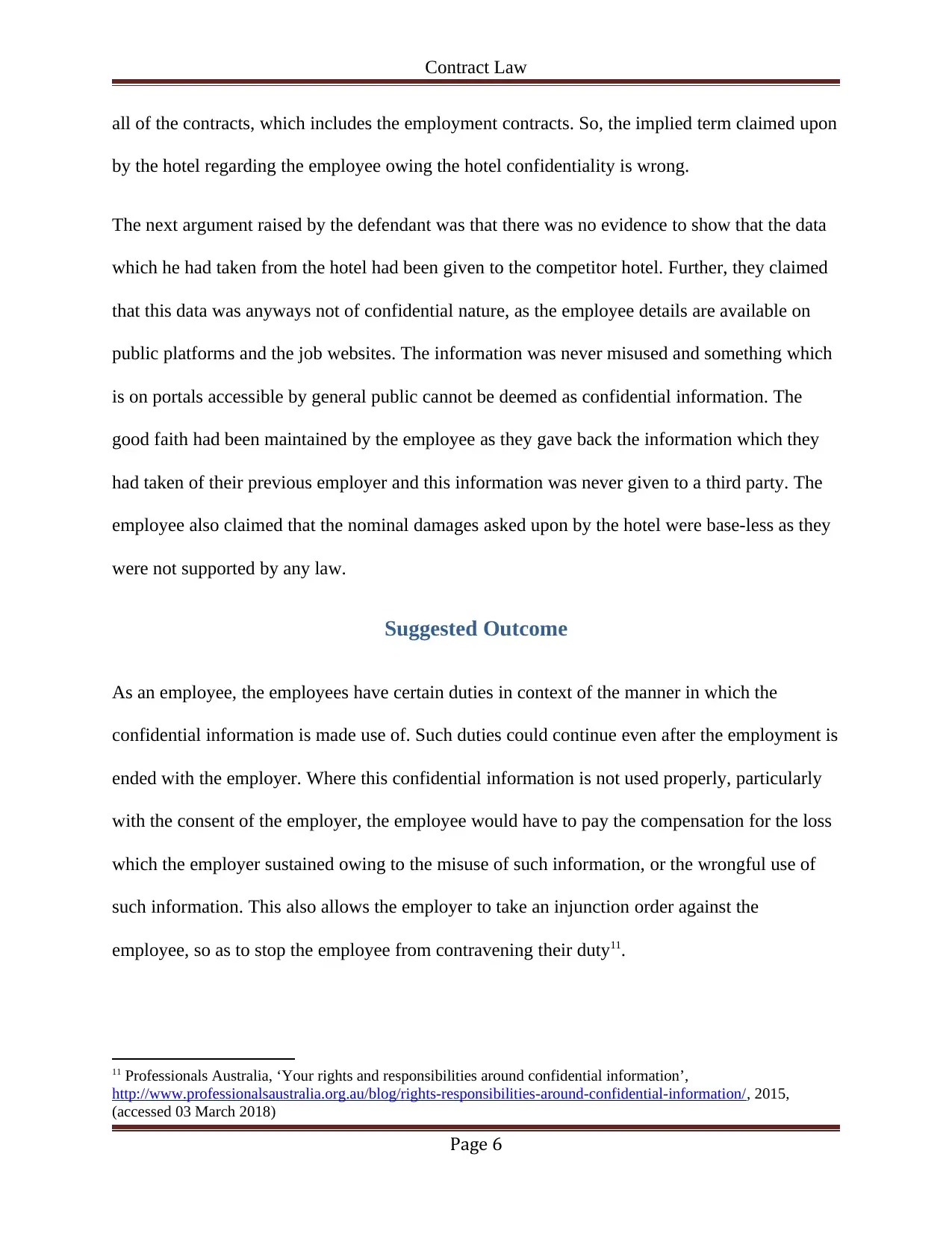
Contract Law
all of the contracts, which includes the employment contracts. So, the implied term claimed upon
by the hotel regarding the employee owing the hotel confidentiality is wrong.
The next argument raised by the defendant was that there was no evidence to show that the data
which he had taken from the hotel had been given to the competitor hotel. Further, they claimed
that this data was anyways not of confidential nature, as the employee details are available on
public platforms and the job websites. The information was never misused and something which
is on portals accessible by general public cannot be deemed as confidential information. The
good faith had been maintained by the employee as they gave back the information which they
had taken of their previous employer and this information was never given to a third party. The
employee also claimed that the nominal damages asked upon by the hotel were base-less as they
were not supported by any law.
Suggested Outcome
As an employee, the employees have certain duties in context of the manner in which the
confidential information is made use of. Such duties could continue even after the employment is
ended with the employer. Where this confidential information is not used properly, particularly
with the consent of the employer, the employee would have to pay the compensation for the loss
which the employer sustained owing to the misuse of such information, or the wrongful use of
such information. This also allows the employer to take an injunction order against the
employee, so as to stop the employee from contravening their duty11.
11 Professionals Australia, ‘Your rights and responsibilities around confidential information’,
http://www.professionalsaustralia.org.au/blog/rights-responsibilities-around-confidential-information/, 2015,
(accessed 03 March 2018)
Page 6
all of the contracts, which includes the employment contracts. So, the implied term claimed upon
by the hotel regarding the employee owing the hotel confidentiality is wrong.
The next argument raised by the defendant was that there was no evidence to show that the data
which he had taken from the hotel had been given to the competitor hotel. Further, they claimed
that this data was anyways not of confidential nature, as the employee details are available on
public platforms and the job websites. The information was never misused and something which
is on portals accessible by general public cannot be deemed as confidential information. The
good faith had been maintained by the employee as they gave back the information which they
had taken of their previous employer and this information was never given to a third party. The
employee also claimed that the nominal damages asked upon by the hotel were base-less as they
were not supported by any law.
Suggested Outcome
As an employee, the employees have certain duties in context of the manner in which the
confidential information is made use of. Such duties could continue even after the employment is
ended with the employer. Where this confidential information is not used properly, particularly
with the consent of the employer, the employee would have to pay the compensation for the loss
which the employer sustained owing to the misuse of such information, or the wrongful use of
such information. This also allows the employer to take an injunction order against the
employee, so as to stop the employee from contravening their duty11.
11 Professionals Australia, ‘Your rights and responsibilities around confidential information’,
http://www.professionalsaustralia.org.au/blog/rights-responsibilities-around-confidential-information/, 2015,
(accessed 03 March 2018)
Page 6
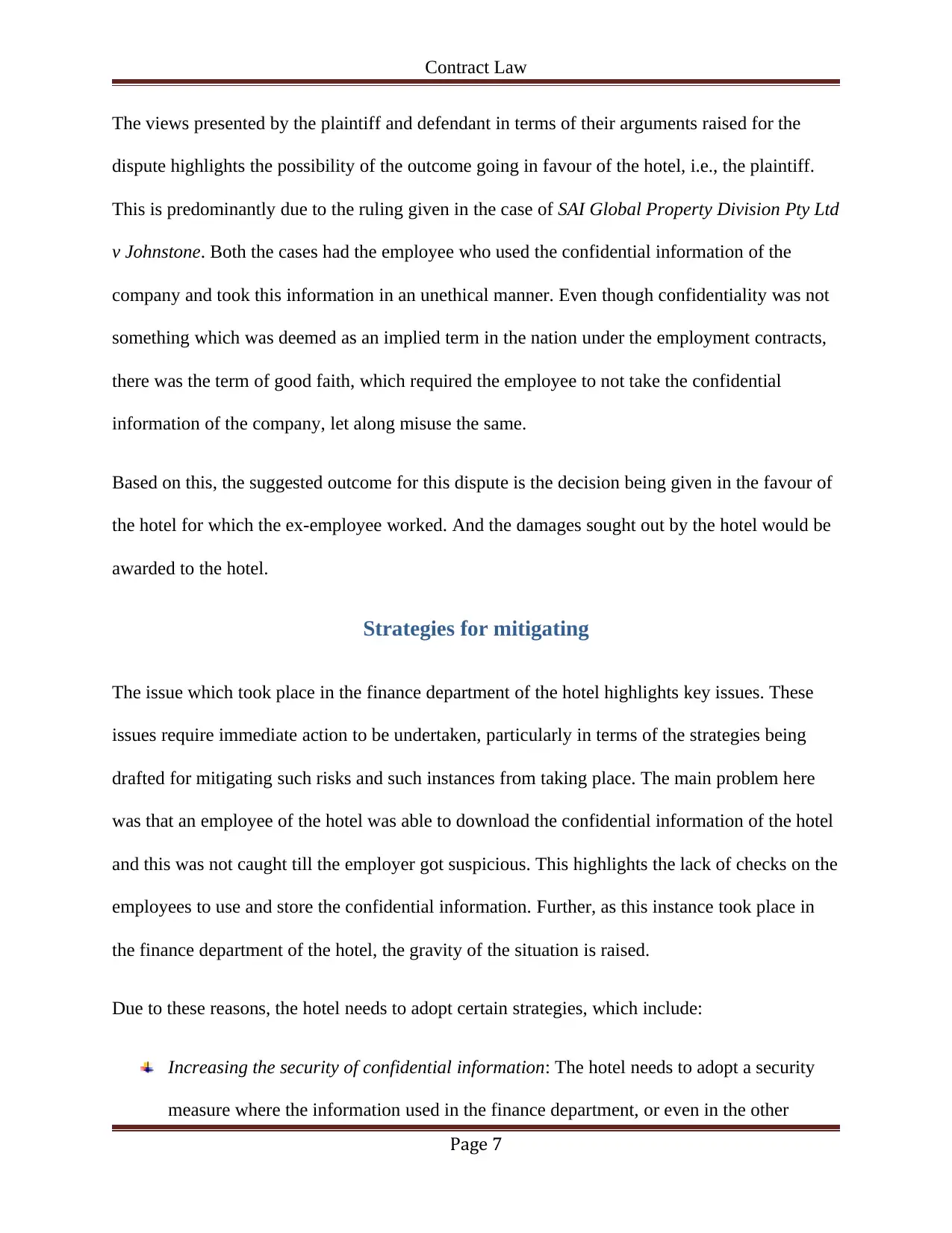
Contract Law
The views presented by the plaintiff and defendant in terms of their arguments raised for the
dispute highlights the possibility of the outcome going in favour of the hotel, i.e., the plaintiff.
This is predominantly due to the ruling given in the case of SAI Global Property Division Pty Ltd
v Johnstone. Both the cases had the employee who used the confidential information of the
company and took this information in an unethical manner. Even though confidentiality was not
something which was deemed as an implied term in the nation under the employment contracts,
there was the term of good faith, which required the employee to not take the confidential
information of the company, let along misuse the same.
Based on this, the suggested outcome for this dispute is the decision being given in the favour of
the hotel for which the ex-employee worked. And the damages sought out by the hotel would be
awarded to the hotel.
Strategies for mitigating
The issue which took place in the finance department of the hotel highlights key issues. These
issues require immediate action to be undertaken, particularly in terms of the strategies being
drafted for mitigating such risks and such instances from taking place. The main problem here
was that an employee of the hotel was able to download the confidential information of the hotel
and this was not caught till the employer got suspicious. This highlights the lack of checks on the
employees to use and store the confidential information. Further, as this instance took place in
the finance department of the hotel, the gravity of the situation is raised.
Due to these reasons, the hotel needs to adopt certain strategies, which include:
Increasing the security of confidential information: The hotel needs to adopt a security
measure where the information used in the finance department, or even in the other
Page 7
The views presented by the plaintiff and defendant in terms of their arguments raised for the
dispute highlights the possibility of the outcome going in favour of the hotel, i.e., the plaintiff.
This is predominantly due to the ruling given in the case of SAI Global Property Division Pty Ltd
v Johnstone. Both the cases had the employee who used the confidential information of the
company and took this information in an unethical manner. Even though confidentiality was not
something which was deemed as an implied term in the nation under the employment contracts,
there was the term of good faith, which required the employee to not take the confidential
information of the company, let along misuse the same.
Based on this, the suggested outcome for this dispute is the decision being given in the favour of
the hotel for which the ex-employee worked. And the damages sought out by the hotel would be
awarded to the hotel.
Strategies for mitigating
The issue which took place in the finance department of the hotel highlights key issues. These
issues require immediate action to be undertaken, particularly in terms of the strategies being
drafted for mitigating such risks and such instances from taking place. The main problem here
was that an employee of the hotel was able to download the confidential information of the hotel
and this was not caught till the employer got suspicious. This highlights the lack of checks on the
employees to use and store the confidential information. Further, as this instance took place in
the finance department of the hotel, the gravity of the situation is raised.
Due to these reasons, the hotel needs to adopt certain strategies, which include:
Increasing the security of confidential information: The hotel needs to adopt a security
measure where the information used in the finance department, or even in the other
Page 7
Paraphrase This Document
Need a fresh take? Get an instant paraphrase of this document with our AI Paraphraser
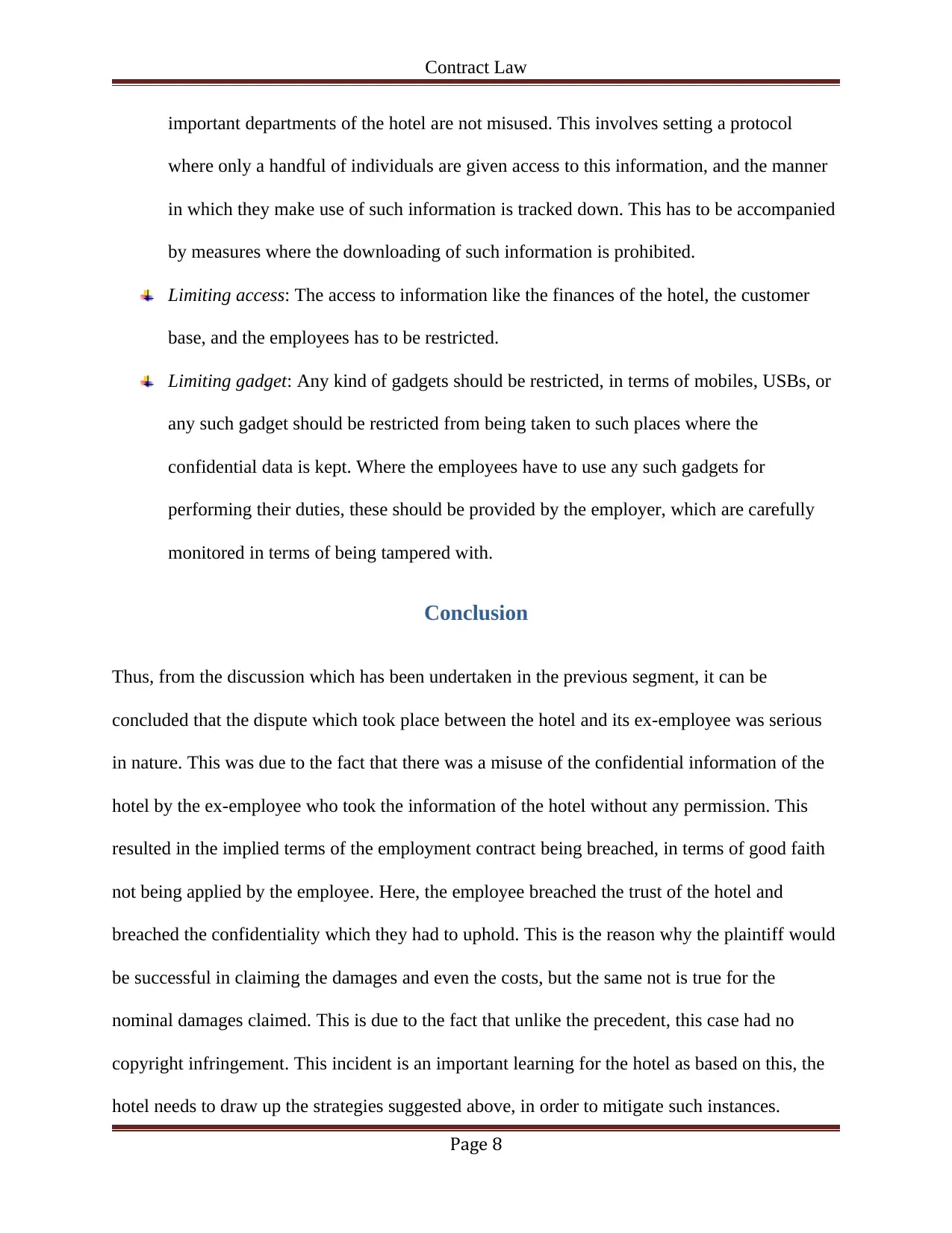
Contract Law
important departments of the hotel are not misused. This involves setting a protocol
where only a handful of individuals are given access to this information, and the manner
in which they make use of such information is tracked down. This has to be accompanied
by measures where the downloading of such information is prohibited.
Limiting access: The access to information like the finances of the hotel, the customer
base, and the employees has to be restricted.
Limiting gadget: Any kind of gadgets should be restricted, in terms of mobiles, USBs, or
any such gadget should be restricted from being taken to such places where the
confidential data is kept. Where the employees have to use any such gadgets for
performing their duties, these should be provided by the employer, which are carefully
monitored in terms of being tampered with.
Conclusion
Thus, from the discussion which has been undertaken in the previous segment, it can be
concluded that the dispute which took place between the hotel and its ex-employee was serious
in nature. This was due to the fact that there was a misuse of the confidential information of the
hotel by the ex-employee who took the information of the hotel without any permission. This
resulted in the implied terms of the employment contract being breached, in terms of good faith
not being applied by the employee. Here, the employee breached the trust of the hotel and
breached the confidentiality which they had to uphold. This is the reason why the plaintiff would
be successful in claiming the damages and even the costs, but the same not is true for the
nominal damages claimed. This is due to the fact that unlike the precedent, this case had no
copyright infringement. This incident is an important learning for the hotel as based on this, the
hotel needs to draw up the strategies suggested above, in order to mitigate such instances.
Page 8
important departments of the hotel are not misused. This involves setting a protocol
where only a handful of individuals are given access to this information, and the manner
in which they make use of such information is tracked down. This has to be accompanied
by measures where the downloading of such information is prohibited.
Limiting access: The access to information like the finances of the hotel, the customer
base, and the employees has to be restricted.
Limiting gadget: Any kind of gadgets should be restricted, in terms of mobiles, USBs, or
any such gadget should be restricted from being taken to such places where the
confidential data is kept. Where the employees have to use any such gadgets for
performing their duties, these should be provided by the employer, which are carefully
monitored in terms of being tampered with.
Conclusion
Thus, from the discussion which has been undertaken in the previous segment, it can be
concluded that the dispute which took place between the hotel and its ex-employee was serious
in nature. This was due to the fact that there was a misuse of the confidential information of the
hotel by the ex-employee who took the information of the hotel without any permission. This
resulted in the implied terms of the employment contract being breached, in terms of good faith
not being applied by the employee. Here, the employee breached the trust of the hotel and
breached the confidentiality which they had to uphold. This is the reason why the plaintiff would
be successful in claiming the damages and even the costs, but the same not is true for the
nominal damages claimed. This is due to the fact that unlike the precedent, this case had no
copyright infringement. This incident is an important learning for the hotel as based on this, the
hotel needs to draw up the strategies suggested above, in order to mitigate such instances.
Page 8
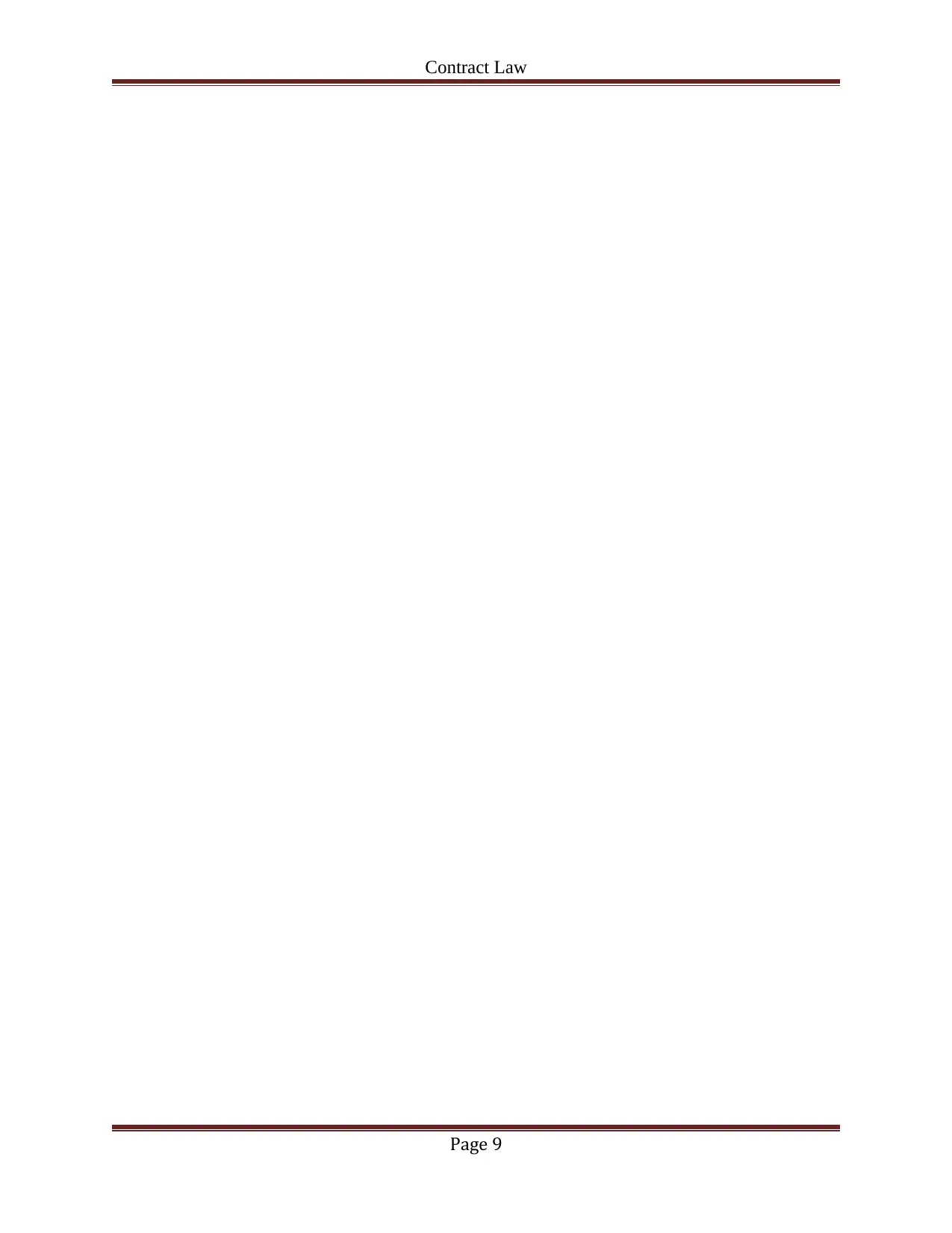
Contract Law
Page 9
Page 9
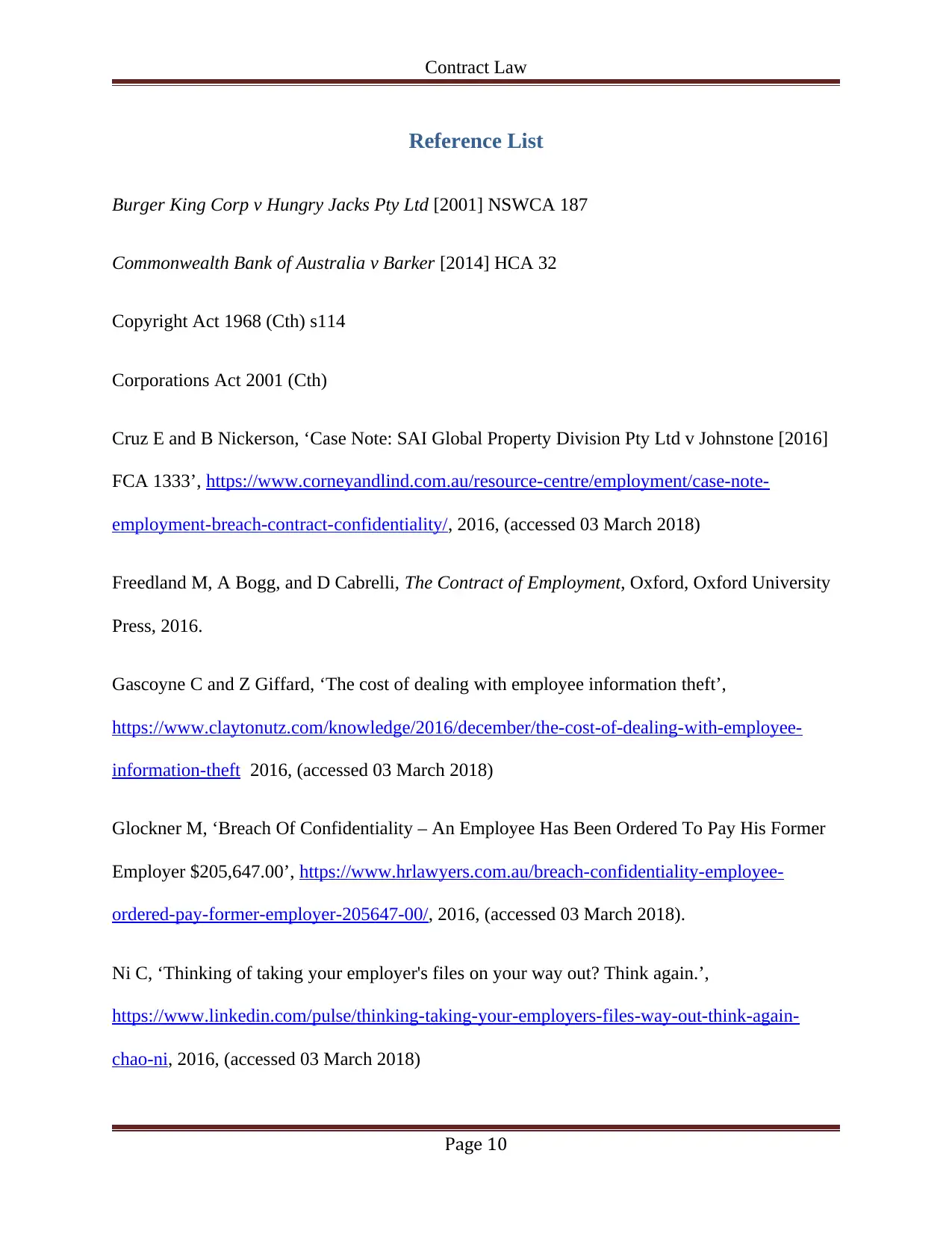
Contract Law
Reference List
Burger King Corp v Hungry Jacks Pty Ltd [2001] NSWCA 187
Commonwealth Bank of Australia v Barker [2014] HCA 32
Copyright Act 1968 (Cth) s114
Corporations Act 2001 (Cth)
Cruz E and B Nickerson, ‘Case Note: SAI Global Property Division Pty Ltd v Johnstone [2016]
FCA 1333’, https://www.corneyandlind.com.au/resource-centre/employment/case-note-
employment-breach-contract-confidentiality/, 2016, (accessed 03 March 2018)
Freedland M, A Bogg, and D Cabrelli, The Contract of Employment, Oxford, Oxford University
Press, 2016.
Gascoyne C and Z Giffard, ‘The cost of dealing with employee information theft’,
https://www.claytonutz.com/knowledge/2016/december/the-cost-of-dealing-with-employee-
information-theft 2016, (accessed 03 March 2018)
Glockner M, ‘Breach Of Confidentiality – An Employee Has Been Ordered To Pay His Former
Employer $205,647.00’, https://www.hrlawyers.com.au/breach-confidentiality-employee-
ordered-pay-former-employer-205647-00/, 2016, (accessed 03 March 2018).
Ni C, ‘Thinking of taking your employer's files on your way out? Think again.’,
https://www.linkedin.com/pulse/thinking-taking-your-employers-files-way-out-think-again-
chao-ni, 2016, (accessed 03 March 2018)
Page 10
Reference List
Burger King Corp v Hungry Jacks Pty Ltd [2001] NSWCA 187
Commonwealth Bank of Australia v Barker [2014] HCA 32
Copyright Act 1968 (Cth) s114
Corporations Act 2001 (Cth)
Cruz E and B Nickerson, ‘Case Note: SAI Global Property Division Pty Ltd v Johnstone [2016]
FCA 1333’, https://www.corneyandlind.com.au/resource-centre/employment/case-note-
employment-breach-contract-confidentiality/, 2016, (accessed 03 March 2018)
Freedland M, A Bogg, and D Cabrelli, The Contract of Employment, Oxford, Oxford University
Press, 2016.
Gascoyne C and Z Giffard, ‘The cost of dealing with employee information theft’,
https://www.claytonutz.com/knowledge/2016/december/the-cost-of-dealing-with-employee-
information-theft 2016, (accessed 03 March 2018)
Glockner M, ‘Breach Of Confidentiality – An Employee Has Been Ordered To Pay His Former
Employer $205,647.00’, https://www.hrlawyers.com.au/breach-confidentiality-employee-
ordered-pay-former-employer-205647-00/, 2016, (accessed 03 March 2018).
Ni C, ‘Thinking of taking your employer's files on your way out? Think again.’,
https://www.linkedin.com/pulse/thinking-taking-your-employers-files-way-out-think-again-
chao-ni, 2016, (accessed 03 March 2018)
Page 10
Secure Best Marks with AI Grader
Need help grading? Try our AI Grader for instant feedback on your assignments.
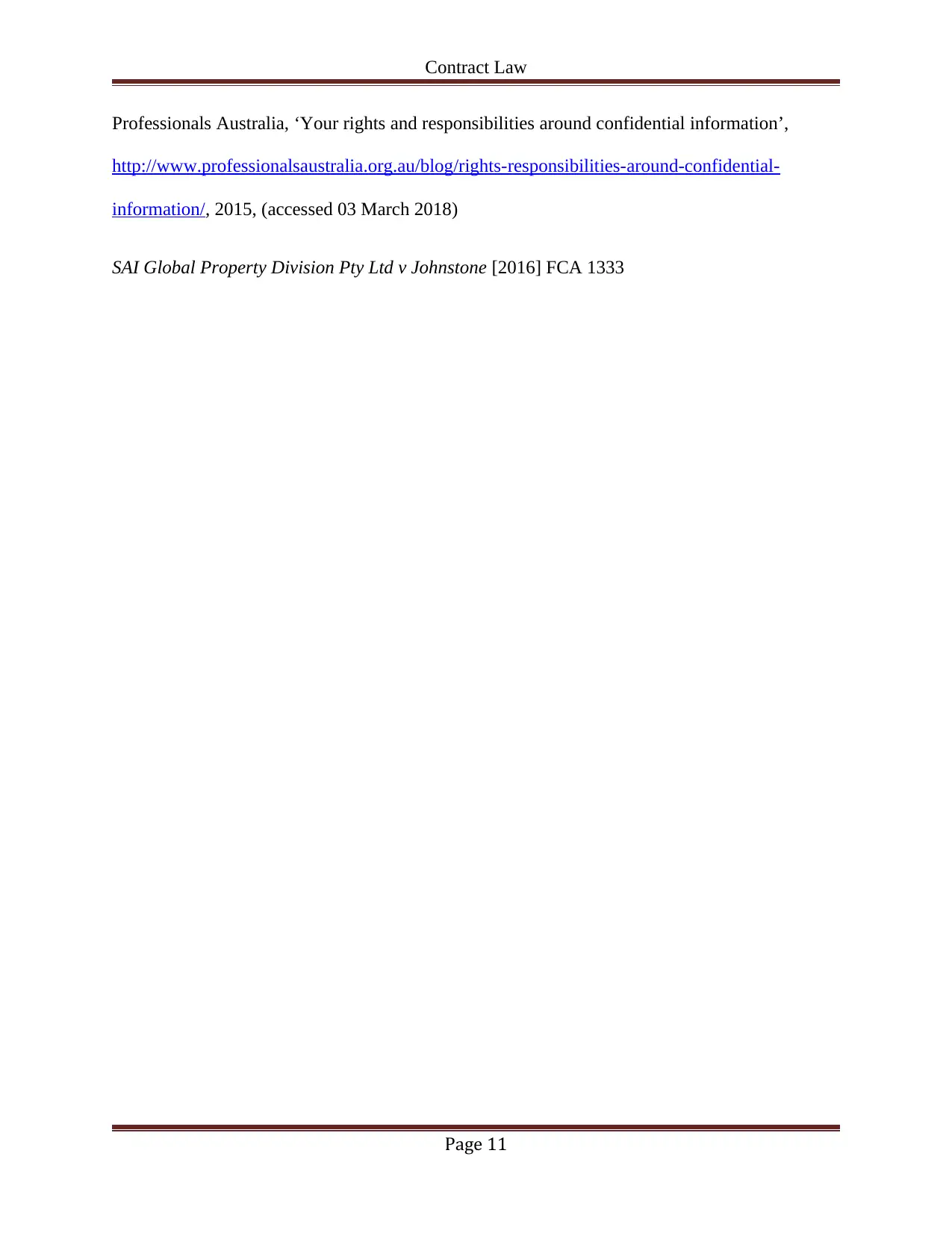
Contract Law
Professionals Australia, ‘Your rights and responsibilities around confidential information’,
http://www.professionalsaustralia.org.au/blog/rights-responsibilities-around-confidential-
information/, 2015, (accessed 03 March 2018)
SAI Global Property Division Pty Ltd v Johnstone [2016] FCA 1333
Page 11
Professionals Australia, ‘Your rights and responsibilities around confidential information’,
http://www.professionalsaustralia.org.au/blog/rights-responsibilities-around-confidential-
information/, 2015, (accessed 03 March 2018)
SAI Global Property Division Pty Ltd v Johnstone [2016] FCA 1333
Page 11
1 out of 11
Related Documents
Your All-in-One AI-Powered Toolkit for Academic Success.
+13062052269
info@desklib.com
Available 24*7 on WhatsApp / Email
![[object Object]](/_next/static/media/star-bottom.7253800d.svg)
Unlock your academic potential
© 2024 | Zucol Services PVT LTD | All rights reserved.




